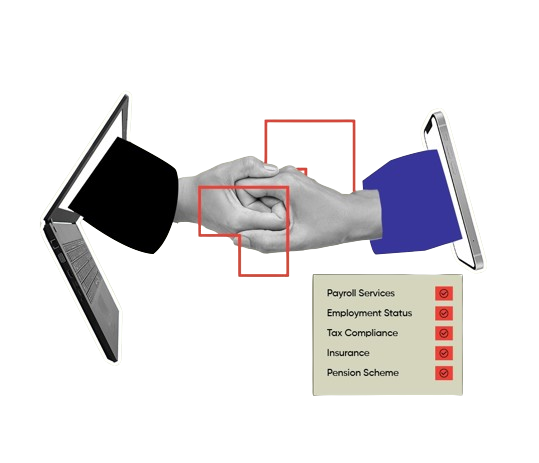TABLE OF CONTENTS
- Do You Classify as an Independent Contractor?
- Are Freelancers and Gig Workers Independent Contractors?
- How Independent Workers Differ?
- How to Become an Independent Contractor in 7 Steps
- Benefits of Working as an Independent Contractor
- Potential Drawbacks of Working as an Independent Contractor
- How to Pay Taxes as an Independent Contractor in the US?
- Streamline Your Independent Contractor Journey with PamGro
- FAQ’s
With the rise of the gig economy, more and more professionals are turning to freelance work to achieve a better work-life balance, increase their earning potential, and enjoy the freedom to choose their own projects.
In this article, we’ll break down the process of becoming an independent contractor into simple steps, highlighting the benefits and potential drawbacks of this career path. We’ll also answer some of the most frequently asked questions about independent contracting, including how does the business license work?, how to obtain an independent contractor license and self-contractor license?
Do You Classify as an Independent Contractor?
Before we dive into the steps, it’s essential to determine whether you qualify as an independent contractor. While there is no standard “test” for independent contractor status, you can use the following guidelines to help determine your classification:
- Are you a self-employed worker hired to do a specific task or project?
- Do you have control over your work schedule and clients?
- Do you bear the responsibility for your own taxes and benefits?
If you answered “yes” to these questions, you likely qualify as an independent contractor.
Accurate classification of employment status is vital. Misclassifying an employee as a contractor, or vice versa, can result in: Hefty fines, Severe penalties & Loss of intellectual property.
Are Freelancers and Gig Workers Independent Contractors?
Freelancers and gig workers are a subset of independent contractors. Freelancers typically work in creative, technical, or professional fields, such as writing, graphic design, programming, or consulting. Gig workers, on the other hand, earn an income through on-demand, short-term jobs, often facilitated by digital platforms or apps.
How Independent Workers Differ?
Independent contractors, freelancers, and gig workers differ in several ways, including:
- Contracts: Independent contractors often engage with clients through more formalized contracts, while freelancers may work on a project-by-project basis without long-term contracts.
- Services performed: Independent contractors and freelancers usually offer specialized services, while gig workers perform tasks that require less specialized skills.
- Autonomy: Independent contractors and freelancers have more control over their work, including their rates and clients, while gig workers’ autonomy is often limited by the rules and algorithms of the platform they work for.
How to Become an Independent Contractor in 7 Steps
Becoming an independent contractor can seem overwhelming, but it doesn’t have to be. Follow these 7 simple steps to get started,
Decide on a Business Structure
When you start working as a contractor, you are a sole proprietor — the exclusive owner of your unregistered business. In a sole proprietorship, there is no legal distinction between you and your business entity, which means your business assets are considered personal assets.
As an independent contractor, selecting the right business structure is crucial for growth and protection. Three primary options to consider are a one-person Limited Liability Company (LLC), incorporation, and partnership.
- A one-person LLC separates personal and business assets, requiring registration and separate tax handling. This structure suits solo operators with no employees.
- Incorporation is ideal for those planning to hire employees or sell products. It may involve establishing a board of directors to guide business decisions.
- For professionals like dentists, lawyers, or accountants, a partnership can be beneficial. This structure shares profits, losses, and taxes among partners.
Failing to choose a business structure has implications. By default, solo operators are considered sole proprietors. However, hiring employees or collaborating with others without registration can lead to penalties and legal consequences, varying by country.
Proper business structuring is essential for tax purposes, liability protection, and compliance with local laws. Choosing the right structure ensures a strong foundation for your independent contracting business.
Choose and Register Your Business Name:
Selecting a unique and consistent business name is a crucial step in establishing your independent contracting business. Choose a name that reflects your brand and will remain unchanged over time.
To protect your business identity, register your name to prevent others from using it. In most areas, registration is required if your business name doesn’t include your full legal name. This involves filing a fictitious business name statement.
Registration offers key benefits. It enables you to enforce contracts and open business bank accounts under your chosen name. Without registration, someone else could potentially claim your business name.
There’s an exception, however. If your business name includes your full legal name (e.g., “Emma Eyre Accounting Services”), registration isn’t necessary.
Failing to register a non-personal business name can have serious consequences. You risk losing the right to enforce contracts and secure banking services. Protect your business identity by registering your unique name.
Get your tax registration certificate
As an independent contractor, obtaining a tax registration certificate is essential. This certificate confirms your business is registered for tax purposes and is typically required by local tax authorities.
Securing a tax registration certificate is crucial for compliance, especially as your business grows. With over 40% of independent workers anticipating economic growth, registering for taxes ensures you’re prepared for increased earnings.
Failure to obtain a tax registration certificate for business taxes can result in penalties, fines, and even misdemeanor charges if you exceed the earnings threshold. Don’t risk non-compliance – register your business for taxes to avoid legal repercussions.
Timely tax registration protects your business and financial well-being. Verify local requirements and obtain your tax registration certificate to:
- Confirm tax compliance
- Avoid penalties and fines
- Ensure business legitimacy
Obtain Any Required Vocational Licenses
As an independent contractor, ensuring you have the necessary professional or vocational license is crucial for operating your business legally. Certain professions, such as electricians, real estate agents, and hairstylists, require specialized licenses.
To confirm licensing requirements, consult your trade association or local government officials. They can provide guidance on the specific licenses necessary for your business.
Operating without required licenses can have severe consequences. It may be considered fraudulent activity, leading to:
- Business shutdowns
- Fines and penalties
- Criminal charges
Protect your business and reputation by obtaining the necessary vocational licenses. Compliance ensures you can operate with confidence and avoid costly repercussions.
Open a Business Bank Account
As an independent contractor, managing finances requires careful planning. Unlike full-time employment, you’re responsible for estimated tax payments. A business bank or business checking account further simplifies this process.
Separating business finances and personal finance finances is crucial for:
- Accurate tax payments
- Financial management
- Business performance assessment
A dedicated business bank or business account enhances credibility with clients, vendors, and suppliers. It also helps avoid:
- Tax calculation errors
- Missed payments
- Penalties and interest on back taxes
By keeping business transactions separate, you’ll ensure financial clarity and avoid unnecessary costs
Set Up to Get Paid
With your business bank account in place, it’s time to streamline your payment process. To get paid efficiently, consider the following essential tools:
- A contract agreement template to outline project terms and expectations
- An invoice template for timely and professional billing
- A reliable payment mechanism for seamless client transactions
Having these tools in place enables you to:
- Simplify client payments
- Reduce payment delays
- Ensure clear project agreements
Secure and efficient payment processes are crucial for a successful independent contracting business.
Benefits of Working as an Independent Contractor
With over 31.9 million independent contractors in the US alone, it’s clear that freelancing’s popularity is on the rise. So, what drives this trend?
- Independence and FlexibilityAs your own boss, you enjoy unparalleled freedom and flexibility. Set your schedule, prioritize exciting projects, and achieve a better work-life balance. A staggering 83% of freelancers cite being their own boss as the top benefit.
- Diverse Opportunities and Financial ControlChoose clients and projects that ignite your passion. Keep 100% of your profits and decide how to invest in your business. As you gain experience, command higher fees and attract more lucrative clients.
- Tax Advantages and Increased EarningsClaim tax deductions on business expenses, reducing your taxable income. With experience, your earning potential grows, making independent contracting a highly lucrative career path.
Platforms like PamGro simplify collaboration and payment processes, connecting independent contractors with global clients.
Embracing independent contracting unlocks:
- Autonomy and flexibility
- Diverse projects and clients
- Improved work-life balance
- Financial control and growth
- Tax benefits
- Increased earning potential
Potential Drawbacks of Working as an Independent Contractor
Before making freelancing your primary income source, consider the potential drawbacks. Being aware of these challenges enables you to prepare and thrive as an independent contractor.
- Increased ResponsibilityAs a solo operator, you bear the risks of business losses. However, this also means you have complete control over finances and can identify potential issues early on.
- No Traditional Employee BenefitsAs an independent contractor, you’re responsible for benefits like health insurance. Yet, this also gives you flexibility to invest in these areas as you see fit.
- Self-Employment Tax ObligationsYou’ll pay self-employment taxes, covering social security, retirement, and Medicare/National Insurance Contributions. This responsibility comes with the freedom to manage your investments.
- Unpredictable IncomeMonthly income may vary initially, but with control over rates, clients, and projects, you can build a stable business over time.
While independent contracting presents challenges, being prepared enables you to:
- Manage financial risks
- Invest in benefits tailored to your needs
- Plan for taxes
- Build a stable, lucrative business
How to Pay Taxes as an Independent Contractor in the US?
As an independent contractor in the US, managing taxes involves understanding self-employment taxes, income taxes, and potential additional obligations.
- Self-Employment Taxes
Pay 15.3% in federal self-employment taxes, covering:
- 12.4% Social Security (capped at $160,200)
- 2.9% Medicare (no upper limit)
- Income Taxes and State Taxes
Pay federal income tax based on net earnings and tax bracket. File state income taxes (if applicable)
- Quarterly Estimated Tax Payments
Use Form 1040-ES to calculate and pay estimated taxes. Make payments if expecting $1,000+ in annual taxes.
- Annual Tax Return Filing
Report income and expenses on Schedule C (Form 1040). Deduct business expenses and claim tax credits.
- Considerations for Older Contractors (65+)
Plan carefully to minimize tax impact on Social Security benefits and retirement accounts
- Penalties for Non-Compliance
Avoid late payment and underpayment penalties. Consult tax professionals to ensure compliance
What about independent contractors in other countries?
Tax laws for independent contractors vary significantly outside the US. Some countries offer simplified tax systems, featuring: Flat rates for small businesses, special arrangements to foster entrepreneurship.
However, many countries impose additional complexities: Value-Added Tax (VAT) on business purchases or Goods and Services Tax (GST) on earnings above a threshold.
Ensure a smooth transition to independent contracting by staying up-to-date on tax regulations.
Streamline Your Independent Contractor Journey with PamGro
Embracing independence brings freedom, flexibility, and unlimited earning potential. As your own boss, you reap the rewards of your hard work and dedication.
PamGro streamlines independent contractor management for companies, enabling seamless onboarding, efficient management, global payments (200+ countries), expert support for global expansion.
PamGro ensures compliance with local laws, benefits, and tax requirements, making global expansion effortless for businesses.
Partner with PamGro to:
- Simplify independent contractor management
- Navigate complex global regulations
- Focus on growing your business
FAQ's
Q: How do I become a private contractor?
A: To become a private contractor, you’ll need to follow the steps outlined in this article, including deciding on a business structure, choosing and registering your business name, getting your tax registration certificate, and obtaining any required vocational licenses.
Q: What is the difference between a 1099 contractor and an independent contractor?
A: A 1099 contractor and an independent contractor are often used interchangeably, but a 1099 contractor refers specifically to an independent contractor who receives a 1099-MISC form from their clients to report their income.
Q: Do I need a license to become an independent contractor?
A: Depending on your state or local government, you may need to obtain an independent contractor license or self-contractor license to operate your business legally.
Q: How do I obtain an independent contractor license?
A: The process for obtaining an independent contractor license varies by state and local government. You’ll need to check with your state or local government to determine the specific requirements.
Q: What is the self-contractor license?
A: A self-contractor license is a type of license that allows individuals to work as independent contractors in certain industries, such as construction or transportation.
Q: How do I become a 1099 independent contractor?
A: To become a 1099 independent contractor, you’ll need to follow the steps outlined in this article, including deciding on a business structure, choosing and paying taxes, registering your business name, getting your tax registration certificate, and obtaining any required vocational licenses.
Make £100 for You & £100 for Your Friend








